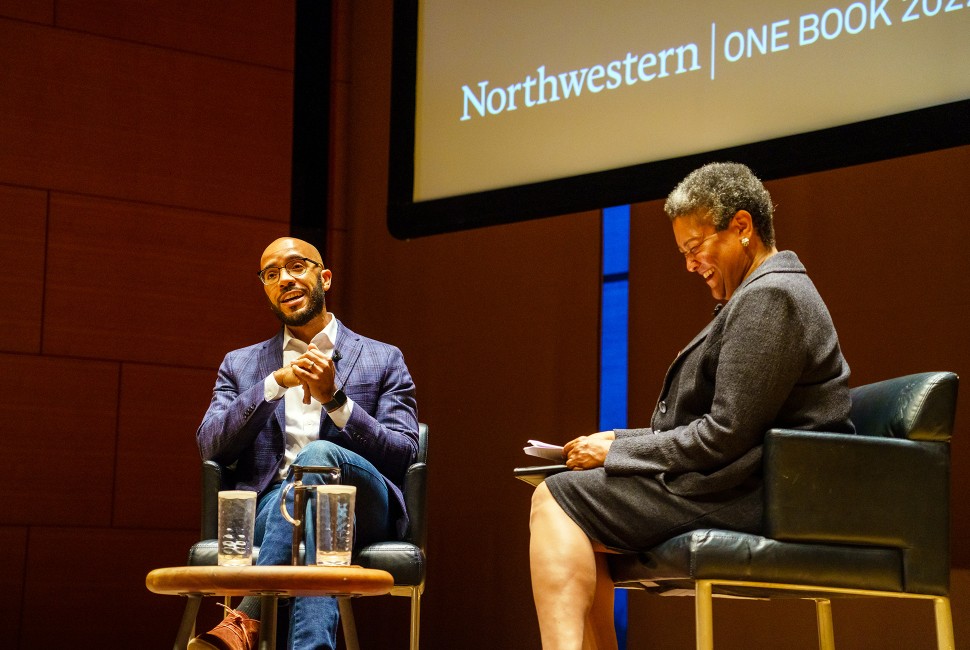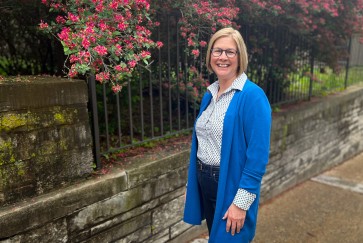Atlantic staff writer Clint Smith delivered two keynote lectures about his book “How the Word Is Passed, A Reckoning with the History of Slavery Across America,” on Northwestern’s Chicago and Evanston campuses Tuesday, Oct. 18. The book is the One Book One Northwestern selection for the 2022-2023 academic year.
Leslie Harris, the current One Book faculty chair who served as the events’ moderator, introduced it as a book that synthesizes “some of the most controversial historical discoveries and recoveries of the past few decades” in an accessible way, and described Smith as a true artist who writes with “honesty and sensitivity.”
The flawed ways we understand slavery
During his talk on the Evanston campus, Smith described the book’s unique approach to engaging with one of America’s most traumatic legacies: “How the Word is Passed” combines a survey of academic scholarship with interviews with ordinary people at historic sites, capturing not only the truth about slavery in America, but the flawed and warped ways in which many of us understand it.
“If people were to fully accept the terror, horror and totality of what slavery was — psychologically, emotionally, socially and politically — then they would have to tell a very different story of America, and about themselves and their relationship to this country,” Smith said. “That's something that people are often really scared to do.”
But Smith explained that the ways in which individuals understand history are often the result of sweeping cultural efforts to either obfuscate or elevate particular narratives. As such, we need to remain conscious of the fact that re-assessing history represents an “existential crisis” for some people, whose identities are tied up in a different understanding of the past.
In particular, Smith recalled a visit to a Confederate cemetery, where he interviewed members of a group called the Sons of Confederate Veterans. In doing so, he spoke with one man who felt that the Civil War was not about slavery or race but about protecting Southern families, communities and states’ rights.
Though objectively wrong, those beliefs, Smith learned, had been passed on to the man by his grandfather, who took the man to the cemetery as a boy, where they shared special moments together watching wildlife and singing.
“It would have been easy for me to go there and try to paint these folks as ridiculous caricatures,” Smith said. “And it’s not that they don’t have bigoted views … They absolutely do. But I think we have to take seriously the sort of emotional texture that undergirds often violent and bigoted beliefs in order to understand why those beliefs exist in the first place.”
The way most people understand history, Smith went on to explain, is not by reading primary documents the way academic historians do. Instead, each person’s sense of history is a combination of things that they learned in school, things that their family and friends told them, media that they consumed and a broader sense of collective identity.
Growing up in New Orleans, Smith said he learned about slavery early in “broad strokes.” Relatives would talk about the fact that the country was “built on our backs,” he said, while in school he learned about some abolitionist heroes, like Frederick Douglass and Harriet Tubman, who gave him a skewed sense of how easy it was to escape slavery and speak out against it.
What he lacked, Smith said, was an understanding of what slavery was actually like for ordinary enslaved people, and a straightforward way to articulate how the legacy of slavery has shaped the contemporary United States, and the condition of Black Americans today.
“I knew what I was hearing was wrong, but … I didn’t have the ideas or the toolkit to push back,” he said.
Activism opens space for scholarship and art
During graduate school at Harvard, Smith studied education, including the mass incarceration of young people in the U.S. He credited social movements like Black Lives Matter with shaping the national discourse in ways that encouraged him and many others to explore new avenues.
“Activists and organizers on the ground open up space in the public discourse for scholarship, art, journalism and writing to enter the public sphere … in ways that they might not otherwise have,” Smith said.
Conducting the research and interviews for the book, he said, was in part a decision to write into existence a book that he wished had existed when he was younger. The book’s mission, he said, is not necessarily to bring about a particular change in society, but instead to inspire people to challenge their own assumptions and also understand the profound proximity of slavery to our society today.
“My hope is that readers approach the book with curiosity, with generosity and with humility,” Smith said. “And hopefully leave the book with a deeper and more acute sense of American history; and perhaps their own understanding of both how they have been taught about American history and their personal relationship to American history and how they fit into it.”
One Book One Northwestern, which invites the campus community to read and discuss one book together over the course of the academic year, is sponsored by the Office of the President and includes related films, lectures, field trips and other programming. Get more information about upcoming events, including exhibitions and lectures. For questions, contact onebook@northwestern.edu.


